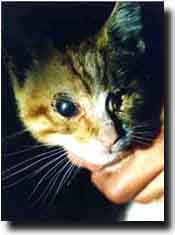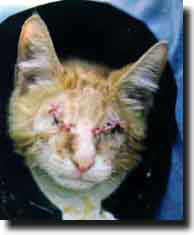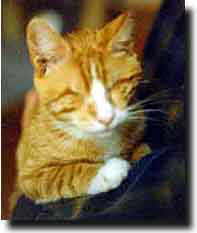 |

|
DijonAt the tender age of (approximately) 8 weeks, Dijon's surviving one minute to the next in the alleys hinged on a level of bravery few of us comprehend.Why was he sitting in the middle of the alley? He didn’t run from the car coming toward him, although he may have recognized the sound of the alley car’s engine, he was old enough to know he should move out of its way. Not until he heard Dee’s footsteps coming close did he take off, up the alley and into an overgrown yard he scampered. He negotiated the terrain expertly and Dee’s first thought was that the kitten was lost to her in the brush of the unkempt yard. The discarded sofa caught her eye. “This would be a good hiding place for a frightened kitten,” Dee was thinking as she examined the piece of furniture; it would have been perfect except for the little orange tail curling out of the tear in the fabric just below the sofa’s arm. The telltale tail. The opening was just big enough for Dee to get her hand in and grab the kitten; she put him on a towel with some food in a carrier where he sat quietly while Dee and her partner finished their night’s work. Dijon’s example teaches us what these animals endure on the streets. He was a blind kitten, forced to learn the geography of his environment (what little of it he dared explore), ill-equipped to find food or water, and no one to assist him in escaping the dangers of street life that eventually take the lives of animals who possess all five senses and quickly strike down the disadvantaged. Yet he persisted in the fight for his life, a fight he would soon have lost had not one of us been in the right place at the right time to catch sight of the orange kitten sitting in the middle of the alley.
The veterinarian determined that neither of his eyes would ever bring him the light of day and that suturing shut the lids was the best option. So he had the surgery (at the time of his neutering) and went to recuperate in foster care with Jeanne and Geoff, who decided Dijon had been through enough. They removed him from the Up For Adoption list and welcomed him as a permanent resident in their home.
|


